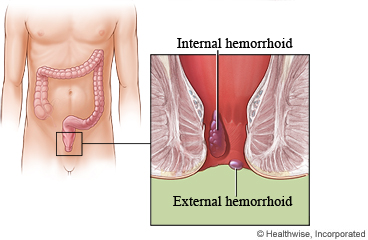
What is infrared photocoagulation?
Infrared photocoagulation treats hemorrhoids. Hemorrhoids are swollen veins in the rectal area. This treatment is only for internal hemorrhoids.
To do the procedure, your doctor uses a beam of infrared light. The light creates heat that scars hemorrhoids and cuts off their blood flow. They shrink and fall off in 7 to 10 days.
Most of the time, this procedure is done in the doctor's office. Your doctor will treat one hemorrhoid at a time. You may feel heat and some pain. It takes about 30 minutes.
Make sure not to lift anything heavy until you heal. It's also important not to strain when you have a bowel movement.
How do you prepare for the procedure?
Procedures can be stressful. This information will help you understand what you can expect. And it will help you safely prepare for your procedure.
 Preparing for the procedure
Preparing for the procedure
- You may need to empty your colon with an enema or laxative. Your doctor will tell you how to do this.
- Be sure you have someone to take you home. Anesthesia and pain medicine will make it unsafe for you to drive or get home on your own.
- Understand exactly what procedure is planned, along with the risks, benefits, and other options.
- If you take a medicine that prevents blood clots, your doctor may tell you to stop taking it before your procedure. Or your doctor may tell you to keep taking it. (These medicines include aspirin and other blood thinners.) Make sure that you understand exactly what your doctor wants you to do.
- Tell your doctor ALL the medicines, vitamins, supplements, and herbal remedies you take. Some may increase the risk of problems during your procedure. Your doctor will tell you if you should stop taking any of them before the procedure and how soon to do it.
- Make sure your doctor and the hospital have a copy of your advance directive. If you don't have one, you may want to prepare one. It lets others know your health care wishes. It's a good thing to have before any type of surgery or procedure.
What happens on the day of the procedure?
-
Follow the instructions exactly about when to stop eating and drinking. If you don't, your procedure may be canceled. If your doctor told you to take your medicines on the day of the procedure, take them with only a sip of water.
-
Take a bath or shower before you come in for your procedure. Do not apply lotions, perfumes, deodorants, or nail polish.
-
Take off all jewelry and piercings. And take out contact lenses, if you wear them.
At the doctor's office
-
Bring a picture ID.
-
You will be awake during the procedure. You may get medicine that relaxes you.
-
The procedure will take about 30 minutes.
-
You will be able to go home right after the procedure.
When should you call your doctor?
- You have questions or concerns.
- You don't understand how to prepare for your procedure.
- You become ill before the procedure (such as fever, flu, or a cold).
- You need to reschedule or have changed your mind about having the procedure.
Where can you learn more?
Go to http://www.healthwise.net/patientEd
Enter M373 in the search box to learn more about "Infrared Photocoagulation for Hemorrhoids: Before Your Procedure".
Current as of: July 31, 2024
Author: Ignite Healthwise, LLC Staff
Clinical Review Board
All Ignite Healthwise, LLC education is reviewed by a team that includes physicians, nurses, advanced practitioners, registered dieticians, and other healthcare professionals.

